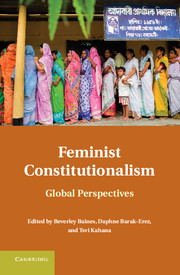Book contents
- Frontmatter
- Contents
- Foreword
- Contributors
- Introduction
- Part I Feminism as a Challenge to Constitutional Theory
- Part II Feminism and Judging
- Part III Feminism, Democracy, and Political Participation
- Part IV The Constitutionalism of Reproductive Rights
- Part V Women's Rights, Multiculturalism, and Diversity
- 17 Constitutional Rights of Women under Customary Law in Southern Africa
- 18 Minority Women
- 19 Watch GRACE Grow
- 20 Critical Multiculturalism
- 21 Democratic Theory, Feminist Theory, and Constitutionalism
- Part VI Women between Secularism and Religion
- Index
- References
17 - Constitutional Rights of Women under Customary Law in Southern Africa
Dominant Interventions and “Old Pathways”
Published online by Cambridge University Press: 05 June 2012
- Frontmatter
- Contents
- Foreword
- Contributors
- Introduction
- Part I Feminism as a Challenge to Constitutional Theory
- Part II Feminism and Judging
- Part III Feminism, Democracy, and Political Participation
- Part IV The Constitutionalism of Reproductive Rights
- Part V Women's Rights, Multiculturalism, and Diversity
- 17 Constitutional Rights of Women under Customary Law in Southern Africa
- 18 Minority Women
- 19 Watch GRACE Grow
- 20 Critical Multiculturalism
- 21 Democratic Theory, Feminist Theory, and Constitutionalism
- Part VI Women between Secularism and Religion
- Index
- References
Summary
In the same way that modern law is not always progressive for women, tradition is not always backward for women. We decided that we had to rethink custom.
Tensions between customary law and human rights – whether contained in a country's constitution or in international human rights instruments – are an established fact. This tension is accentuated in countries whose constitutions protect inherently conflicting rights, such as the rights to gender equality, dignity, and security of the person, on the one hand, and the right to participate in one's culture of choice and customary law rights, on the other hand. Several constitutions on the Continent now carry these kinds of provisions.
The main approaches to resolving these conflicts in Southern Africa are legislative and judicial interventions to which we refer as dominant interventions. However, it seems that preoccupation with these interventions has for a long time diverted the attention of women’s rights scholars and activists both from 1) their limitations and 2) the needs to search for, and recognize, alternative approaches identified by studies on the rights of women in the region. Specific reference is made in this chapter to the approach identified with Women and Law in Southern Africa Research Project (WLSA) of engaging with customary law to protect the rights of women. We have labeled this approach the “old pathways.” This label is intended to underscore the point that, although the WLSA approach goes as far back as 1988, it has not featured prominently in current strategies and interventions for protecting women’s rights in the region in the same way that the dominant interventions have.
- Type
- Chapter
- Information
- Feminist ConstitutionalismGlobal Perspectives, pp. 317 - 335Publisher: Cambridge University PressPrint publication year: 2012
References
- 3
- Cited by



